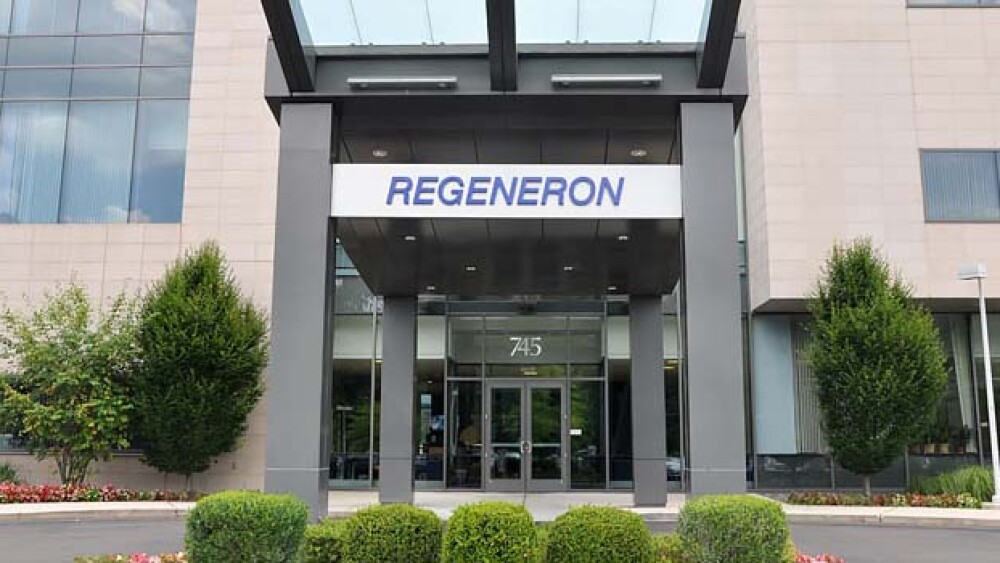Regeneron Pharmaceuticals and its developmental partner Sanofi are eying the third quarter of this year to seek regulatory approval for Dupixent (dupilumab) as a potential monotherapy treatment for moderate-to-severe atopic dermatitis in adolescents.
Regeneron Pharmaceuticals and its developmental partner Sanofi are eying the third quarter of this year to seek regulatory approval for Dupixent (dupilumab) as a potential monotherapy treatment for moderate-to-severe atopic dermatitis in adolescents.
The companies will seek approval from the U.S. Food and Drug Administration based on positive Phase III results that showed Dupixent met its primary and key secondary endpoints. Regeneron said treatment with Dupixent “significantly improved measures of overall disease severity, skin clearing, itching and certain health-related quality of life measures.” Tarrytown, N.Y.-based Regeneron said Dupixent is the “first and only biologic” to show positive results in this patient population.
Dupixent, which was approved by the FDA last year as a treatment for atopic dermatitis, inhibits signaling of IL-4 and IL-13, two key cytokines involved with the inflammation associated with dermatitis, a Type 2 allergic inflammatory disease. Regeneron Chief Scientific Officer George D. Yancopoulos said the company is committed to investigating the potential use of Dupixent across Type 2 inflammatory diseases. In addition to atopic dermatitis, other Type 2 inflammatory diseases include asthma, eosinophilic esophagitis, nasal polyps, chronic obstructive pulmonary disease and food allergy. In March Regeneron and Sanofi filed a supplemental Biologics License Application for Dupixent as an add-on maintenance for people with moderate-to-severe asthma.
For adolescents, the target patient population for this study, Yancopoulos said moderate-to-severe atopic dermatitis can be a “particularly significant burden.” That is largely due to “oozing skin lesions with unrelenting, intense itching,” Yancopoulos said.
Moderate-to-severe atopic dermatitis is characterized by rashes often covering much of the body, and can include intense, persistent itching and skin dryness, cracking, redness, crusting, and oozing.
Elias Zerhouni, president of Global Research & Development at Sanofi, said current treatment options for the adolescent patients includes topical and oral steroids, as well as non-steroidal immunosuppressants. However, Zerhouni said those medicines can have significant side effects. Zerhouni said the two companies are studying Dupixent as a therapy that treats the underlying cause of the Type 2 inflammatory diseases rather than just the symptoms.
Phase III data showed that treatment with Dupixent significantly improved disease severity at 16 weeks, Regeneron said. The results showed that 41.5 percent of patients who received the medicine every two weeks and 38 percent of patients who received Dupixent every four weeks achieved 75 percent or greater skin improvement compared to 8 percent with placebo. Additionally, Regeneron said 24 percent of patients who received weight-based dosing of the medicine and 18 percent who received a fixed 300 mg dose every four weeks, achieved the primary endpoint of clear or almost clear skin. That was in comparison to 2 percent on placebo. The trial included 251 patients who were 12 to 17 years of age with moderate-to-severe atopic dermatitis whose disease could not be adequately controlled with topical medications. Regeneron said 92 percent of trial participants suffered from at least one concurrent allergic condition such as allergic rhinitis, asthma or food allergy.
The companies said there were no serious adverse events or events leading to treatment discontinuation in either of the Dupixent treatment groups during the Phase III trial. At higher doses, there were some injection site reactions, but they were low.





